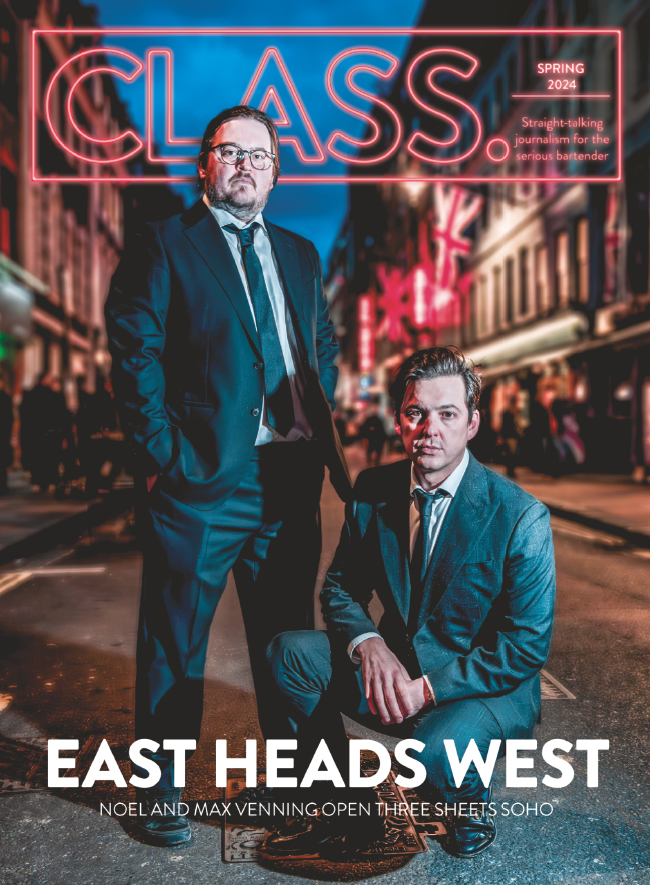
A bar employer’s generosity comes in many forms, says Edmund Weil.
Speakeasy Entertainment has won its fair share of awards over the years, but they’ve always come with a healthy dose of impostor syndrome. Whatever input Rosie and I had, it felt as if the lion’s share of the merit and plaudits belonged elsewhere - with our partners, our designers, our chefs, bartenders, managers.
We were therefore delighted to be shortlisted for the newly-created Bar Employer of the Year Class Award in 2022, and over the moon to win it this year. Hospitality is a labour intensive industry and an award recognising those who empower and facilitate the people who drive it forward feels like an achievement we can call our own.
How did we get here? As with everything we’ve achieved in this industry, it’s chiefly by learning from mistakes. So many mistakes. I’ve given far too much power and responsibility to people unsuited to either, because it was easier to do that than step up myself.
I’ve avoided confrontation when it needed to happen, and just as often waded into a situation when my input was neither requested nor required. I’ve ignored trusted managers when they have raised concerns about someone without clear evidence – failing to do the inconvenient digging and paying the price down the line.
I’ve held on to responsibilities and relationships that should have formed part of the role of a key employee because I enjoyed it and didn’t want to let go. I’ve waffled self-indulgently through my own off-agenda thoughts for far too long in weekly management meetings. I’ve held important disciplinary meetings while ill-prepared and fluffed the comms. I’ve allowed excellent employees to drift off course and lost them. We’ve made a ton of mistakes, and I hope we’ve learned from most of them to become better.
On the other hand, there are some qualities within our organisation that have led many people over the years to stay with us for a long enough time to build something special. So long in fact, that we have a veteran employee about to complete her second maternity leave after nearly 13 years.
Generosity
So what are the fundamentals of being a good employer in the bar industry? I think it starts with generosity. Hospitality attracts people with generous spirits, and if they see that quality reflected in their employer, they’re much more likely to cut them some slack when the shit hits the fan. With such generosity of spirit often comes a reciprocal desire for validation – hence the impulse to interact with and please guests. Staff who receive validation from their employer as well as their guests will feel doubly fulfilled. The longer I’ve been in this gig, the more importance I’ve come to place on frequently finding ways to let the team know they are trusted and appreciated.
Of course, generosity goes a long way beyond words. Its most obvious form is financial, and our simple mantra in this area is to endeavour to ensure that our staff never feel underpaid. There will always be better-paid jobs out there, so the aim is to pay enough that money doesn’t become an issue, while providing a fun and fulfilling place to work.
Sadly, since the pandemic and with the current levels of inflation, this has become a real challenge for the first time, and salaries currently form a larger proportion of our turnover than ever before in almost all of our venues.
Luckily, there are more important measures of generosity than money. Generosity lies in striving to create conditions where every employee can flourish. Looking for and nurturing talents within your team. Actively thinking about opportunities for growth. Hosting your teams. Not just taking them out for activities, dinner and drinks, but finding a way to actually serve them food and pour them wine. These people spend their working life hosting others, and the warmth they show to your guests is the lifeblood of your business. Reflecting some of that warmth back to them is a powerful gesture.
It’s easy to get close to your staff ; hospitality is an intense trade where emotions can run high, and people often need a shoulder to cry on or an ear into which to vent. As our business has grown, we’ve come to realise that we should probably not be that person to our employees. Heartless as this might sound, an element of distance is just as important as warmth and generosity. With distance comes trust. Over the years we’ve gone from running pretty much every element of head office and front of house in our business to giving our managers the space and respect they need to grow into their roles and become better than we ever were.
Distance is also necessary when you need to put the needs of your business ahead of those of an individual – however valued they may be. Sometimes an employee is right for the job but not for the team. To put it bluntly, if the person you need to discipline or dismiss counts you as a close friend, you’re going to have a problem.
Distance vs disconnection Distance is not the same as disconnection. There are so many ways of learning from and engaging with employees while maintaining distance. For example, we have a monthly ‘day with directors’ where any employee in the company can book in with us for a coffee or a meal. It’s a structured way to build familiarity with those members of staff who want it while keeping a door open to anyone who feels the need to discuss concerns that they may not want to share with their manager. Conversely, a well-designed anonymous survey on a Google form reveals more about the workplace than any individual tête à tête. We try to run these regularly in all our venues, but they are particularly useful when you’re getting weird vibes off a team and can’t put your finger on it.
Exit interviews are also particularly illuminating. We always urge leavers to let it all hang out, and unvarnished feedback from trusted and long-serving employees in this context has probably been our most valuable tool in improving both our company and ourselves. Perhaps it’s no coincidence that it’s the employees who’ve served us up with the coldest, hardest truths in their exit interviews who’ve gone on to become our firmest friends.

